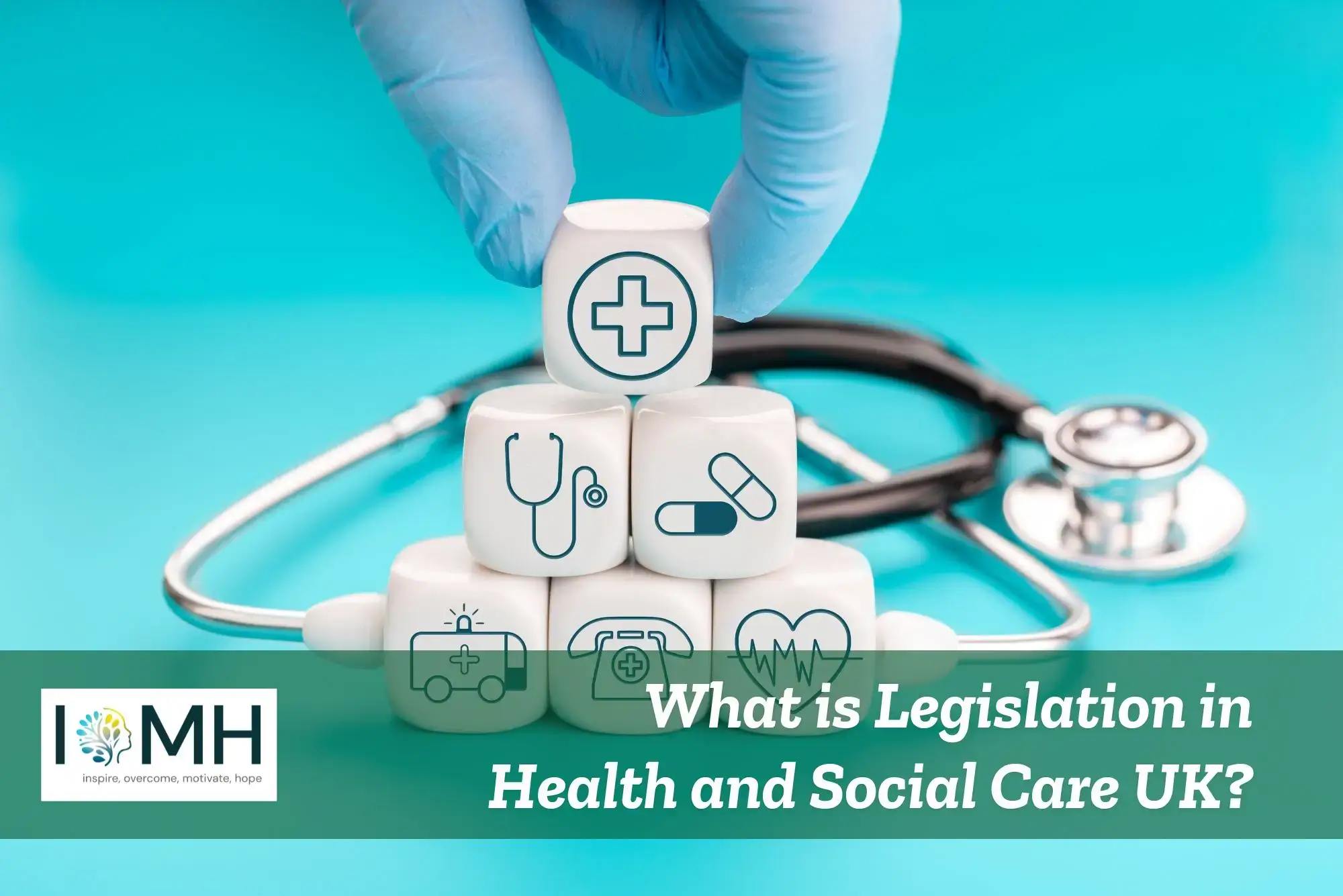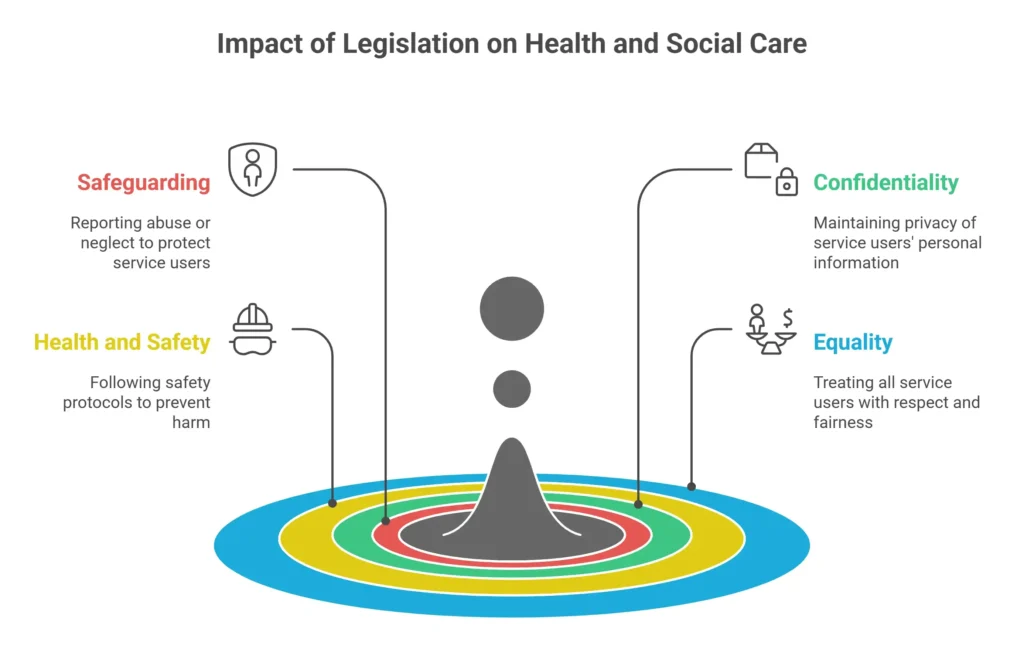
Legislation in health and social care refers to the laws and rules that guide how care services are provided in the UK. These laws make sure that people who receive care are safe, respected, and treated fairly. They also set standards for organisations and staff so that services are delivered to a high standard.
Whether you are working in a care home, hospital, or community service, understanding these laws is essential. This is why the Level 3 Diploma in Health and Social Care includes units on legislation. By learning about the main acts and regulations, you can work confidently and follow the right procedures in your role.
In this blog, we’ll explore what legislation in health and social care means, why it’s important, and provide a detailed list of legislation in health and social care UK to help you in your studies and daily work.
What is Legislation in Health and Social Care?
Legislation in health and social care is a collection of laws created by the UK government to protect the rights, safety, and well-being of people receiving care. These laws also guide care providers on how to deliver services fairly and safely.
They cover many important areas, such as:
- Health and safety in the workplace
- Equality and non-discrimination
- Data protection and confidentiality
- Safeguarding vulnerable adults and children
The government and different organisations make sure these laws are followed. The Care Quality Commission (CQC) inspects services in England, checking that care providers meet the required standards. The NHS also follows these laws to make sure patients receive safe and effective treatment.
For learners studying health and social care level 3, understanding legislation is not just about passing assignments—it’s about being able to put these rules into action when supporting people as a Healthcare Assistant, support worker, or care worker.
Start a Rewarding Career in Level 3 Diploma in Health and Social Care
Why Legislation is Important in Health and Social Care
Legislation plays a vital role in protecting both service users and staff. Here’s why it matters:
- Protects Rights – Laws ensure that everyone has the right to be treated with respect, dignity, and fairness, regardless of age, gender, ethnicity, or disability.
- Keeps People Safe – Legislation such as the Health and Safety at Work Act makes sure workplaces are safe for staff and service users.
- Ensures Quality – By setting clear standards, laws help maintain a high level of care across all services.
- Promotes Equality – Acts like the Equality Act 2010 make sure no one faces discrimination in care services.
- Creates Accountability – If something goes wrong, legislation ensures there are systems in place to investigate and make improvements.
In your Level 3 Diploma in Health and Social Care studies, you’ll see how each law links to day-to-day care tasks. For example, following safe moving and handling guidelines is not just good practice—it’s part of the law.
Key Principles of Health and Social Care Legislation
Legislation in health and social care is built around core principles that guide how services should be delivered. These principles make sure care is fair, safe, and respectful for everyone.
- Equality and Diversity – Everyone should be able to access care services and receive support without discrimination, no matter their age, gender, ethnicity, religion, or disability.
- Safeguarding – Protecting vulnerable adults and children from harm, neglect, or abuse, and taking action if concerns arise.
- Confidentiality – Ensuring personal information is kept private and only shared when it is necessary for safety or care purposes.
- Health and Safety – Creating and maintaining a safe environment for both service users and staff, in line with safety regulations.
- Empowerment – Supporting individuals to have a say in their own care and make informed choices about the support they receive.
By keeping these principles in mind, you can apply the law in a way that benefits those you support—whether you are a care manager, social worker, or Healthcare Assistant providing hands-on care.

List of Legislation in Health and Social Care UK
Here is a list of legislation in health and social care UK that you will often come across, especially when studying for your Level 3 qualification:
- Health and Safety at Work Act 1974 – Ensures employers provide a safe working environment and that staff follow safety procedures.
- Care Act 2014 – Sets out how adults should be cared for and supported, including the duties of local authorities.
- Children Act 1989 & 2004 – Protects the welfare of children and outlines the responsibilities of those who care for them.
- Data Protection Act 2018 (GDPR) – Protects personal data and ensures information is used fairly and securely.
- Equality Act 2010 – Prevents discrimination based on characteristics like age, race, disability, gender, and religion.
- Human Rights Act 1998 – Protects basic rights such as the right to life, freedom from inhuman treatment, and respect for private life.
- Mental Capacity Act 2005 – Protects people who may not be able to make decisions for themselves and sets out how decisions should be made in their best interest.
- Working Time Regulations 1998 – Ensures fair working hours, rest breaks, and holiday entitlement.
When you know these laws, you can make better decisions in your work and stay within legal requirements.
Role of Regulatory Bodies
Regulatory bodies are organisations that make sure health and social care services follow the law and meet required standards. They monitor, inspect, and guide care providers to keep services safe and effective.
- Care Quality Commission (CQC) – The CQC is responsible for inspecting and regulating health and adult social care services in England. It checks that services are safe, effective, and respectful, and it publishes reports for the public to see. If a service does not meet the required standards, the CQC can take action to make sure improvements are made.
- NHS England – Oversees healthcare services across the country, ensuring they meet patient needs and follow national laws, policies, and quality guidelines.
- Local Authorities – Local councils have important responsibilities in safeguarding both adults and children. They also provide and oversee certain social care services within their communities.
These organisations work together to make sure care services are safe, lawful, and focused on the well-being of those who use them.
How Legislation Impacts Daily Work in Health and Social Care
Legislation affects almost everything you do in a care setting. Here are a few examples:

In the Health and Social Care, you’ll often be asked to give examples of how legislation is applied in practice, so these real-life scenarios are important to understand.
Legislation and the Level 3 Diploma in Health and Social Care
The Level 3 Diploma in Health and Social Care includes legislation because it forms the foundation of safe and effective care. Knowing the law means you can:
- Recognise your responsibilities as a care worker.
- Understand the rights of those you support.
- Follow correct procedures in different situations.
Assignments may involve explaining how a law applies to a specific case or describing the role of the CQC in maintaining standards. This knowledge not only helps you complete the course but also ensures you are ready to work in line with legal requirements.
Conclusion
Legislation in health and social care is there to protect, guide, and improve the services people rely on. By following the laws, you make sure that care is safe, fair, and respectful for everyone.
For anyone studying the Level 3 Diploma in Health and Social Care or working as a Healthcare Assistant, understanding legislation is a vital part of learning. It connects directly to real-life situations in care work and helps you act in the best interest of those you support.
By learning about the list of legislation in health and social care UK and how it applies in daily practice, you can contribute to a safer and more caring environment for all.





0 responses on "What is Legislation in Health and Social Care UK?"